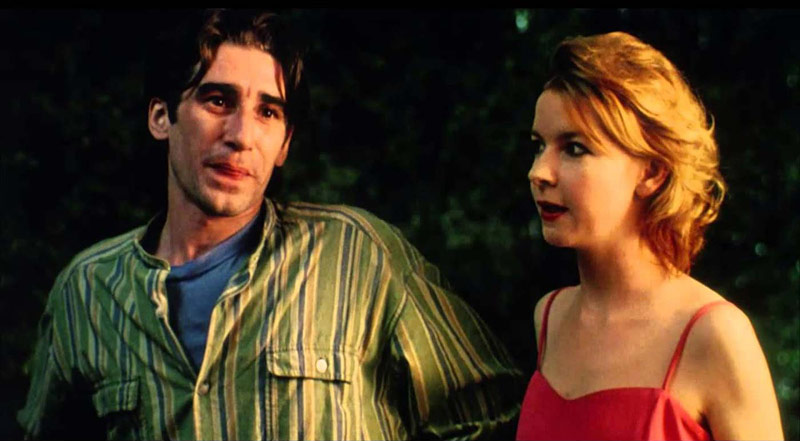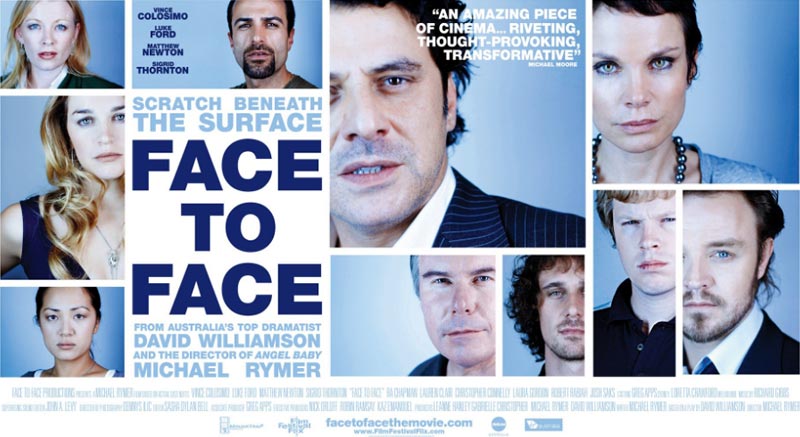Showing all posts about Michael Rymer
Angel Baby, a story of doomed loved, and changing Australian accents
14 May 2024

A scene from Angel Baby, a film by Michael Rymer, depicting stars Jacqueline McKenzie and John Lynch.
Angel Baby, trailer, is the 1995 debut feature of Australian filmmaker Michael Rymer. You may have seen some of his other work: Battlestar Galactica, Hannibal, both TV series, and/or his 2012 feature, Face to Face, but likely you’ve not have heard of Angel Baby.
Filmed in Melbourne, Angel Baby tells the story of a doomed love shared by Kate (Jacqueline McKenzie) and Harry (John Lynch), both of whom are battling severe mental illnesses. I won’t say too much more about it, except to note this is an example of under-appreciated Australian cinema.
And, possibly, an exemplification of how Australian accents have changed over thirty years. I say this because I was amazed at how distinct, how strong, some of the actor’s accents were. I live in Australia, and am surrounded by people with Australian accents.
That’s obviously a no-brainer — well, to an extent — but it means generally Australian accents should sound “neutral” to me, because I’m exposed to them daily. Mostly, that is. I spend several days a week in Sydney, a diverse city. Here, Australian accents are only a sample of the many I hear daily.
Perhaps this accounts for why I found some of the accents in Angel Baby so pronounced, so unmissable, because in reality I am not wholly immersed by them. But it seems to me, to detect an accent, local to the region you reside in, which may otherwise seem indiscernible, you need to go outside that area, to begin to perceive it.
I spent several years in London, England not Canada, and after a few months could easily detect Antipodean accents. It was an odd sensation to speak on the phone to lifelong friends living down under, and notice their accents. To notice, effectively, my accent. I wonder if you can pick up my accent on the phone, to lift a line from the Waifs’ 2002 song, London Still.
Australian accents are said to fall into three main categories: broad, general, and cultivated. The Australian accents I detected in Angel Baby had to be in the board category. Of course, there are any number of explanations as to why the accents seemed pronounced.
Could it be I was hearing not wholly familiar Melbourne variations of the Australian accent? Or could it be some of the actors were asked to emphasise their accents, Angel Baby being an Australian production, and all. Perhaps Rymer wanted people, particularly overseas audiences, to make no mistake they were watching an Australian film.
But I also began wondering if the internet was playing some part in my hearing Australian accents on Australian soil? Angel Baby was made in 1995. The year after 1994, which Angela Watercutter, writing recently for Wired, described as the last year before culture began to migrate online.
Could it be imagined Australian accents were among this migration, where they began to blend with every other English language accent, every other accent full stop, and begin altering? Of course, accents from other global regions are still distinct. I have no trouble discerning, for example, Irish, North American, or English accents.
Or those of other cultures, because different accents stand out. But might thirty years of internet culture, monoculture perhaps, be making a difference? Unlike thirty years ago, today we are constantly hearing, constantly absorbing, the voices of speakers from across the globe, on the web, and social media.
Might this be resulting in accents — I don’t know — dissolving into each other a bit? Are we unwitting students of elocution lessons, being served up through the world wide web? Accordingly, a “normal” Australian accent of thirty years ago, may sound quite different today. But who knows? Perhaps I am only imagining this would-be diction.
One thing is certain though. If you have the chance, look at Angel Baby. If you’re a Kanopy member, it may be available in your region.
RELATED CONTENT
film, Jacqueline McKenzie, John Lynch, language, Michael Rymer, trends
Face to Face, a film by Michael Rymer, with Matthew Newton and Luke Ford
12 September 2012

Face to Face (trailer), a drama, is the latest feature of Australian film director Michael Rymer (Perfume, Queen of the Damned), who also produced the Battlestar Galactica TV shows from 2003 to 2009. Face to Face is Rymer’s film adaptation of the play of the same name, written by Queensland based playwright David Williamson, in 2000.
Face to Face traces the proceedings of a community conference, a trial scheme that takes minor matters out of the court system, and brings together all who are party to a dispute. The process allows everyone to tell their side of the story, under the auspices of a moderator, who later drafts a resolution that binds on all involved.
Wayne (Luke Ford), a former employee of a Melbourne scaffolding company, is a hot headed young man who lost his job as result of violent outbursts and inappropriate conduct in the workplace. Luke finds himself before a community conference after ramming his ute into the car of ex-boss, Greg Baldoni (Vince Colosimo).
Wayne is supported by his mother Maureen (Lauren Clair), and best friend Barry (Josh Saks). Meanwhile Greg’s wife Claire (Sigrid Thornton), Julie (Laura Gordon) his secretary, Therese (Ra Chapman) the accountant, Richard (Chris Connelly) the foreman, and Hakim (Robert Rabiah) a worker, turn out for the company.
As the conference progresses though, Jack (Matthew Newton) who is moderating, often struggles to control tensions in the room. As the complicated series of events that led to Wayne’s outbursts work their way to the surface, tempers fray and emotions erupt, but it becomes clear there is far more to his actions than meet the eye.
For a drama that for the most part features ten people sitting in just one room for almost ninety minutes, Face to Face is utterly compelling. The key to this intrigue lies in both its strong characters, the ceaseless allure of gossip, together with the voyeuristic pleasure of witnessing people’s dirty laundry being aired in public.
In opening a can of worms that leaves just about everyone present embarrassed to a greater or lesser degree, Face to Face is a reminder that there are always two sides, maybe more, to every story. Robust performances, solid scripting, together with a deprecating humour, combine to create intense, gripping, fly on the wall style drama.
Originally published Wednesday 12 September 2012.
RELATED CONTENT
film, legacy, Luke Ford, Matthew Newton, Michael Rymer
